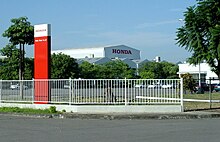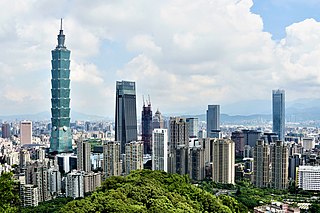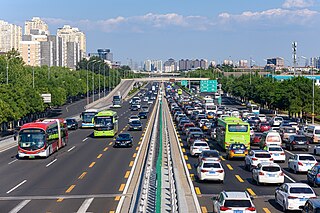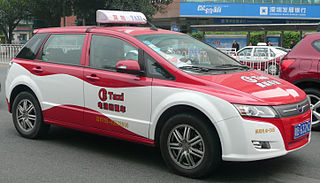
Automotive industry in Taiwan refers to the automotive industry in Taiwan.

Automotive industry in Taiwan refers to the automotive industry in Taiwan.

In total, there are around 3,000 automotive-related companies in Taiwan. Hotai Motor accounted for 28.8% of the total cars sold in Taiwan, followed by China Motor Corporation (10.9%), Yulon Nissan Motor Corporation (9.6%) and Honda Taiwan (7.7%). [1]
Around 41.7% of vehicles sold in Taiwan were imported. In 2016, around 75% of automotive parts and components produced in Taiwan were exported, mainly to the United States (43%, valued at NT$67.8 billion), Japan (6%, valued at NT$9.5 billion), China (5%, valued at NT$8.2 billion) and United Kingdom (4%, valued at NT$5.6 billion). [2]
Annually, there are 400,000 cars sold in Taiwan. [2] In total, the output of the entire automotive industries in Taiwan accounted for almost 3% of Taiwan's gross domestic product. In 2016, the output of automotive industry in Taiwan amounted US$20 billion, which was divided into parts and components manufacturing (US$7 billion), domestic car production (US$6.5 billion) and vehicle electronics (US$6 billion). [1] In 2013, the automotive industry output accounted for 2.7% of Taiwan's total manufacturing output. [2]
Taiwanese firms increasingly invested in automotive electrification, 75% of Tesla, Inc.’s suppliers are Taiwanese. [3] Taiwan is one of the few places in the world with a comprehensive EV supply chain and Taiwan is an integral part of global EV supply chains. [4]
Automotive-related research institutes in Taiwan are Automotive Research & Testing Center and Industrial Technology Research Institute. [2]

The economy of Taiwan is a highly developed free-market economy. It is the 8th largest in Asia and 20th-largest in the world by purchasing power parity, allowing Taiwan to be included in the advanced economies group by the International Monetary Fund. Taiwan is notable for its rapid economic development from an agriculture-based society to an industrialised, high-income country. This economic growth has been described as the Taiwan Miracle. It is gauged in the high-income economies group by the World Bank. Taiwan is one of the most technologically advanced computer microchip and high-tech electronics industries makers in the world.
The automotive aftermarket is the secondary parts market of the automotive industry, concerned with the manufacturing, remanufacturing, distribution, retailing, and installation of all vehicle parts, chemicals, equipment, and accessories, after the sale of the automobile by the original equipment manufacturer (OEM) to the consumer. The parts, accessories, etc. for sale may or may not be manufactured by the OEM.

Magna International Inc. is a Canadian parts manufacturer for automakers. It is one of the largest companies in Canada and was recognized on the 2020 Forbes Global 2000. The company is the largest automobile parts manufacturer in North America by sales of original equipment parts; it has ranked consistently in the Fortune Global 500 list for 20 years in a row since 2001. It produces automotive systems, assemblies, modules, and components, which are supplied to General Motors, Ford and Stellantis, as well as BMW, Mercedes, Volkswagen, Toyota, Tesla, and Tata Motors, among others.

The Toyota RAV4 EV is an all-electric version of the popular RAV4 SUV produced by Toyota until 2014. Two generations of the EV model were sold in California, and to fleets elsewhere in the US, with a gap of almost ten years between them.

Crude electric carriages were first invented in the late 1820s and 1830s. Practical, commercially available electric vehicles appeared during the 1890s. An electric vehicle held the vehicular land speed record until around 1900. In the early 20th century, the high cost, low top speed, and short-range of battery electric vehicles, compared to internal combustion engine vehicles, led to a worldwide decline in their use as private motor vehicles. Electric vehicles have continued to be used for loading and freight equipment and for public transport – especially rail vehicles.
BYD Auto Co., Ltd. is the automotive subsidiary of BYD Company, a publicly listed Chinese multinational manufacturing company. It manufactures passenger battery electric vehicles (BEVs) and plug-in hybrid electric vehicles (PHEVs), collectively known as new energy vehicles (NEVs) in China. It also produces electric buses and trucks.

The automotive industry inmainland China has been the largest in the world measured by automobile unit production since 2008. As of 2024, mainland China is also the world's largest automobile market both in terms of sales and ownership.

Agriculture is one of the main industries in Taiwan. It contributes to the food security, rural development and conservation of Taiwan. Around 24% of Taiwan's land is used for farming.

An electric car or electric vehicle (EV) is a passenger automobile that is propelled by an electric traction motor, using only energy stored in on-board batteries. Compared to conventional internal combustion engine (ICE) vehicles, electric cars are quieter, more responsive, have superior energy conversion efficiency and no exhaust emissions and lower overall vehicle emissions. The term "electric car" normally refers to plug-in electric vehicle, typically a battery electric vehicle (BEV), but broadly may also include plug-in hybrid electric vehicle (PHEV), range-extended electric vehicle (REEV) and fuel cell electric vehicle (FCEV).

Advanced Technology Vehicles Manufacturing (ATVM) Loan Program is a $25 billion direct loan program funded by Congress in fall 2008 to provide debt capital to the U.S. automotive industry for the purpose of funding projects that help vehicles manufactured in the U.S. meet higher mileage requirements and lessen U.S. dependence on foreign oil. Of the 108 requests made, 5 were approved to receive $8.4 billion, with the majority of that amount under repayment.
This article provides an overview of the automotive industry in countries around the world.
Rivian Automotive, Inc., is an American electric vehicle manufacturer and automotive technology and outdoor recreation company founded in 2009. Rivian produces an electric sport utility vehicle (SUV) and pickup truck on a "skateboard" platform that can support future vehicles or be adopted by other companies. An electric delivery van, the Rivian EDV, is also being produced. Rivian started deliveries of its R1T pickup truck in late 2021. The company planned to build an exclusive charging network in the United States and Canada by the end of 2023.

The electric vehicle industry in China is the largest in the world, accounting for around 57.4% of global production of electric vehicles (EVs) and around 500,000 exports in 2021. In 2021, CAAM reported China had sold 3.34 million passenger electric vehicles, consisting 2.73 million BEVs and 0.6 million PHEV, which is around 53% share of the global market of 6.23 million "new energy" passenger vehicles – BEVs, PHEVs, and HEVs. China also dominates the plug-in electric bus and light commercial vehicle market, reaching over 500,000 buses and 247,500 electric commercial vehicles in 2019, and recording new sales of 186,000 commercial EVs in 2021.

The Renault–Nissan–Mitsubishi Alliance, originally known as the Renault–Nissan Alliance, is a French-Japanese strategic alliance between the automobile manufacturers Renault, Nissan and Mitsubishi Motors, which together sell more than one in nine vehicles worldwide. Renault and Nissan are strategic partners since 1999 and have nearly 450,000 employees and control eight major brands: Renault, Nissan, Mitsubishi, Infiniti, Renault Korea, Dacia, Alpine, and Venucia. The car group sold 10.6 million vehicles worldwide in 2017, making it the leading light vehicle manufacturing group in the world. The Alliance adopted its current name in September 2017, one year after Nissan acquired a controlling interest in Mitsubishi and subsequently made Mitsubishi an equal partner in the Alliance.
Tesla, Inc., an electric vehicle manufacturer and clean energy company founded in San Carlos, California in 2003 by American entrepreneurs Martin Eberhard and Marc Tarpenning. The company is named after Serbian-American inventor Nikola Tesla. Tesla is the world's leading electric vehicle manufacturer, and, as of the end of 2021, Tesla's cumulative global vehicle sales totaled 2.3 million units.

Lucid Group, Inc. is an American manufacturer of luxury electric vehicles, headquartered in Newark, California. Lucid vehicles are designed in California and manufactured at Lucid's factory in Arizona. The company was founded in 2007. Since April 2019, Lucid has been majority-owned by the Public Investment Fund, the sovereign wealth fund of Saudi Arabia.
Contemporary Amperex Technology Co., Limited, abbreviated as CATL, is a Chinese battery manufacturer and technology company founded in 2011 that specializes in the manufacturing of lithium-ion batteries for electric vehicles and energy storage systems, as well as battery management systems (BMS). The company is a major EV battery manufacturer, with a global market share of around 37% in 2023.
The textile industry in Taiwan is a major industry in Taiwan.
The semiconductor industry, including Integrated Circuit (IC) manufacturing, design, and packaging, forms a major part of Taiwan's IT industry. Due to its strong capabilities in OEM wafer manufacturing and a complete industry supply chain, Taiwan has been able to distinguish itself as a leading microchip manufacturer and dominate the global marketplace. Taiwan’s semiconductor sector accounted for US$115 billion, around 20 percent of the global semiconductor industry. In sectors such as foundry operations, Taiwanese companies account for 50 percent of the world market, with Taiwan Semiconductor Manufacturing Company (TSMC) the biggest player in the foundry market.
Foxtron Inc. or Foxtron Vehicle Technologies is a Taiwanese manufacturer of electric cars and buses based in Taipei, operating since 2020 as a joint venture between the technology company Foxconn and the car company Yulon.